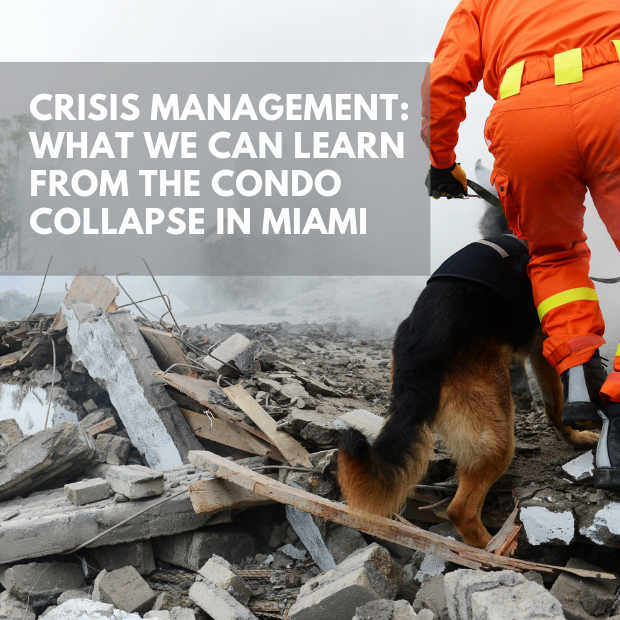
What We Can Learn From The Condo Collapse in Miami
7 Things We Can Learn About Crisis Management From The Miami Condo Collapse
Let’s take a look at seven crisis management lessons that the condo collapse highlighted.
Be Proactive
Before any crisis occurs, it is best to act quickly to prevent the escalation of a potential problem. After the collapse of the Surfside condo, there was documentation that showed what state the condo had been in before its collapse. Various structures within the condo were in poor condition.
We cannot know for sure if these structural issues contributed to the collapse of the condo. However, the condo’s collapse could perhaps have been prevented had there been proactive steps taken that minimized structural risks.
The primary goal should always be to stop a crisis from happening in the first place.
Make Sure You Only Release Accurate Information
In any crisis, it’s important to handle information responsibly in order to refrain from causing more panic.
As with the condo collapse, authorities had to assess when to release important information regarding damages, injuries, and the death toll. By knowing when to release what, they were able to inform and console many loved ones during this tragic event.
By releasing inaccurate information too soon during a crisis, you could cause more public outrage. Although third parties may press for more information, it is better to ensure that the data is correct before releasing it. Not only will this improve your credibility, but it will also prevent a PR disaster.
Don’t Speculate
When a crisis hits, it’s tempting to compare it to similar disasters. Based on what happened during similar past events, one can easily speculate about what’s going to happen next. However, in the event of any crisis, you need to avoid speculation at all costs.
Wondering about the causes, effects, injuries, or tactics that may be used to solve a crisis is natural. But, by sharing your musings with the world, you could cause even more panic.
To keep everyone calm, you should always communicate responsibly. Rather than speculate, wait until you know all the facts before communicating with a third party.
Communication Is Critical
Crisis communication plays a vital role in managing any crisis effectively. How you communicate to your audience is very important. Avoid blaming anyone and don’t make any rash judgments. Instead, take your time assessing the situation and the outcomes of all your options.
If possible, it would be better to shift all the communication responsibilities to a firm that specializes in crisis management. This is exactly what the condominium association in Florida did after the condo collapse.
Be Transparent
In order to handle a crisis effectively, you have to be transparent. This can be hard, seeing as some of the details relating to a crisis can be upsetting. However, telling half-truths can not only damage your integrity but also cause more harm than good.
No matter how uncomfortable, the truth should be communicated clearly and tactfully. Once you have all the facts lined up, there should be no reason to not share all the pertinent information.
When the Florida condo collapsed, the public remained updated around the clock. This helped everyone come to terms with what happened.
Have A Crisis Plan In Place
No one wants to think that the worst possible disaster will strike their business. However, you still need to be prepared for anything. Not only will it help you to get back on your feet sooner, but it will also show leadership, thoughtfulness, and compassion.
Your company should have a crisis plan in place for every possible scenario that can affect your employees, customers, and your business itself. By having a crisis protocol in place, you can avoid panic and jump right into action mode when it’s needed.
When the condo collapsed in Florida, the condo association relied on many regulations and outside help to navigate the situation. Without a proper plan in place, it will take you much longer to get to the bottom of any crisis.
Be Flexible
Even if you are prepared, a crisis can still knock the wind out of your sails. In situations like these, you need to be flexible in how you manage a sticky situation. What would have worked six months ago may not work now. By objectively analyzing the situation, you will be able to make informed decisions much faster.
The condominium collapse in Florida triggered conversations about revising condominium regulations. To stay up to date with the latest requirements, you have to be flexible to accommodate changes in your regulatory environment.
Key Takeaways
The condo collapse was a tragic event that made worldwide headlines. However, we can learn from that loss and implement new crisis management protocols that will help prepare us to communicate more effectively with key stakeholders during the next disaster.









